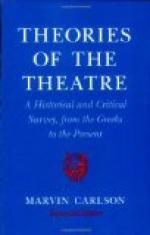and then refuse to house in them the productions of
any independent manager who opposed them. By this
procedure on the part of the theatre trust, the few
managers who maintained their independence were forced
to build theatres in those cities where they wished
their attractions to appear. When, a few years
later, the organised opposition to the original theatre
trust grew to such dimensions as to become in fact
a second trust, it could carry on its campaign only
by building a new chain of theatres to house its productions
in those cities whose already existing theatres were
in the hands of the original syndicate. As a result
of this warfare between the two trusts, nearly all
the chief cities of the country are now saddled with
more theatre-buildings than they can naturally and
easily support. Two theatres stand side by side
in a town whose theatre-going population warrants
only one; and there are three theatres in a city whose
inhabitants desire only two. In New York itself
this condition is even more exaggerated. Nearly
every season some of the minor producing managers
shift their allegiance from one trust to the other;
and since they seldom seem to know very far in advance
just where they will stand when they may wish to make
their next production in New York, the only way in
which they can assure themselves of a Broadway booking
is to build and hold a theatre of their own.
Hence, in the last few years, there has been an epidemic
of theatre building in New York. And this, it
should be carefully observed, has resulted from a
false economic condition; for new theatres have been
built, not in order to supply a natural demand from
the theatre-going population, but in defiance of the
limits imposed by that demand.
A theatre-building is a great expense to its owners.
It always occupies land in one of the most costly
sections of a city; and in New York this consideration
is of especial importance. The building itself
represents a large investment. These two items
alone make it ruinous for the owners to let the building
stand idle for any lengthy period. They must keep
it open as many weeks as possible throughout the year;
and if play after play fails upon its stage, they
must still seek other entertainments to attract sufficient
money to cover the otherwise dead loss of the rent.
Hence there exists at present in America a false demand
for plays,—a demand, that is to say, which
is occasioned not by the natural need of the theatre-going
population but by the frantic need on the part of warring
managers to keep their theatres open. It is,
of course, impossible to find enough first-class plays
to meet this fictitious demand; and the managers are
therefore obliged to buy up quantities of second-class
plays, which they know to be inferior and which they
hardly expect the public to approve, because it will
cost them less to present these inferior attractions
to a small business than it would cost them to shut
down some of their superfluous theatres.




